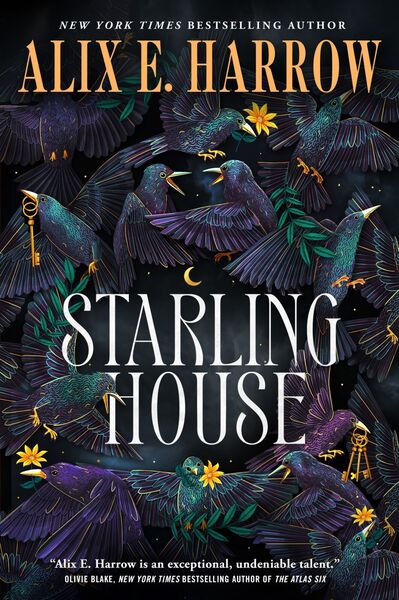Where Paradise Lay
Starling House
By Alix E. Harrow

10 Jul, 2025
0 comments
Alix E. Harrow’s 2024 Starling House is a Southern gothic horror novel.
Eden, Kentucky is paradise… for Don Gravely, CEO of Gravely Power, and his luckier kin. For the less fortunate inhabitants of Eden, the town is a polluted, misfortune-plagued prison from which entrenched poverty makes escape impossible1.
Twenty-seven-year-old Opal may never escape. She is determined that her bright younger brother Jasper will. For Jasper to escape, Opal needs money for his tuition.
Enter Starling House, infamous mansion of E. Starling, author of The Underland.
Wealthy recluse Eleanor Starling commissioned Starling House in the 19th century. Since then, the house has been the domain of a succession of owners, each selected by means obscure, each fated to doleful deaths. Starling House has a grim reputation. Sensible people avoid Starling House.
Opal once treasured The Underland as a favourite book. She dreams of Starling House. Therefore, when Arthur Starling warns her away from the mansion, she ignores the warning. When Arthur offers her a job as a maid, she accepts.
The mansion having gone uncleaned for years, the task ahead of Opal is daunting. Still, time spent cleaning allows Opal to better appreciate subtle details, such as the house’s ability to replace its own lightbulbs and adopt features (like electrification) that inhabitants might desire. In a very real sense, Starling House is alive and aware.
Elizabeth Baine of Innovative Solutions Consulting Group can see Opal’s potential. Innovative Solution’s task is to obtain for Gravely Power title to Starling House, which sits on land the Gravely family has coveted since the 19th century. Opal has access to Starling House. Opal’s finances are shaky. Opal’s status as Jasper’s guardian is precarious. If Baine cannot bribe Opal to become their agent, then she can at least intimidate and control Opal.
The only possible flaw in Baine’s perfect plan is the possibility that Starling House sits on top of what amounts to a tunnel to Hell through which monsters emerge. Now just suppose that Starling House’s occupants were wardens protecting Eden from monsters most locals cannot even see. If either of those things were true, Baine’s bid to commandeer Starling House could have calamitous consequences. Still, what are the odds of that, in a Southern gothic novel?
~oOo~
Eden isn’t just in Kentucky. It’s in Muhlenberg County, Kentucky, which many of us know from famed singer and Donald Trump casualty John Prine’s song, Paradise. Now, I’ve never been to that woeful place2, but the song gives the impression that Muhlenberg county has been transformed into a petrochemical Mordor [3]. Harrow takes some liberties with Prine’s lyrics.
Well, I’m sorry my son, but you’re too late in asking / Old Gravely’s coal train has hauled it away…
It’s Peabody in the original. Like Peabody, Gravely wasn’t pleased by the song.
I am not sure how I feel about the author’s decision to set the novel in Muhlenberg county. Publicizing Prine and his song are always good. However, Muhlenberg county voted 76.62% MAGA in 2024 (and almost as high in 2020 and 2016). The case for protecting Eden from monsters is therefore not rock-solid. Odds are three in four that any Muhlenberg resident (or at least any voting-age resident who votes) killed by monsters will be someone whom the US in particular and the world in general would be better off without.
That may sound unduly harsh4, but the entire plot is predicated on Eden being home to people who were and have been for generations sufficiently unpleasant, predatory, and immune to moral or legal suasion that opening a metaphoric gateway to Hell to unleash nigh-unstoppable Beasts on them seemed to one of their victims like a reasonable course of action5. As it turned out, there were some unforeseen externalities6… which are minor compared to the externalities coal mining inflicts. The fact the gateway to Hell plan failed to rid Eden of the Gravelys shows the plan is flawed, although what that flaw is unclear.
Harrow avoids the issue above by focusing on sympathetic characters like Opal, Jasper, and Arthur (and Bev, whom I didn’t have room to mention). Opal and a few others don’t deserve to be shredded by monsters. As escape is difficult, perhaps even impossible, Opal had better stack sandbags on the levy lest she and her loved ones be washed away in the flood.
This judicious focus delivers a horror novel about whose outcome the reader will care (and not in the sense of hoping the Beasts don’t miss any Gravelys). Every Harrow novel I’ve read entertained me, this being no exception… so why haven’t I read them all?
Starling House is available here (Tor), here (Barnes & Noble), here (Bookshop US), here (Bookshop UK), here (Chapters-Indigo), and here (Words Worth Books).
1: USA delenda est.
2: I am always surprised to see how close Kentucky is to Canada. Or maybe alarmed.
3: Featuring all too many red MAGA hats since 2016.
4: Don’t get me started on Ontarians whining about the erosion of public services under Ford. 55% of the voters stayed home, and 20% of the voters voted PC, which means 75% of Ontarian voters chose not to block a third Ford term. If the person complaining isn’t in that 25% who voted something other than PC, I have no sympathy. Elections have consequences. Make the fucking time to educate yourself and vote.
5: I am reminded of Bob Shaw’s Vertigo, which is set in an Alberta town populated almost entirely by awful people.
6: The Beasts have a particular mad-on for Gravelys, which yay if it weren’t for the little fact there have been a lot of Gravely bastards, not all of whom (or their descendants) are terrible people. Probably.
The fact that Beasts can be fine-tuned to go after a particular category of target suggests they could be as useful as land-mines in the field of wildlife preservation.
